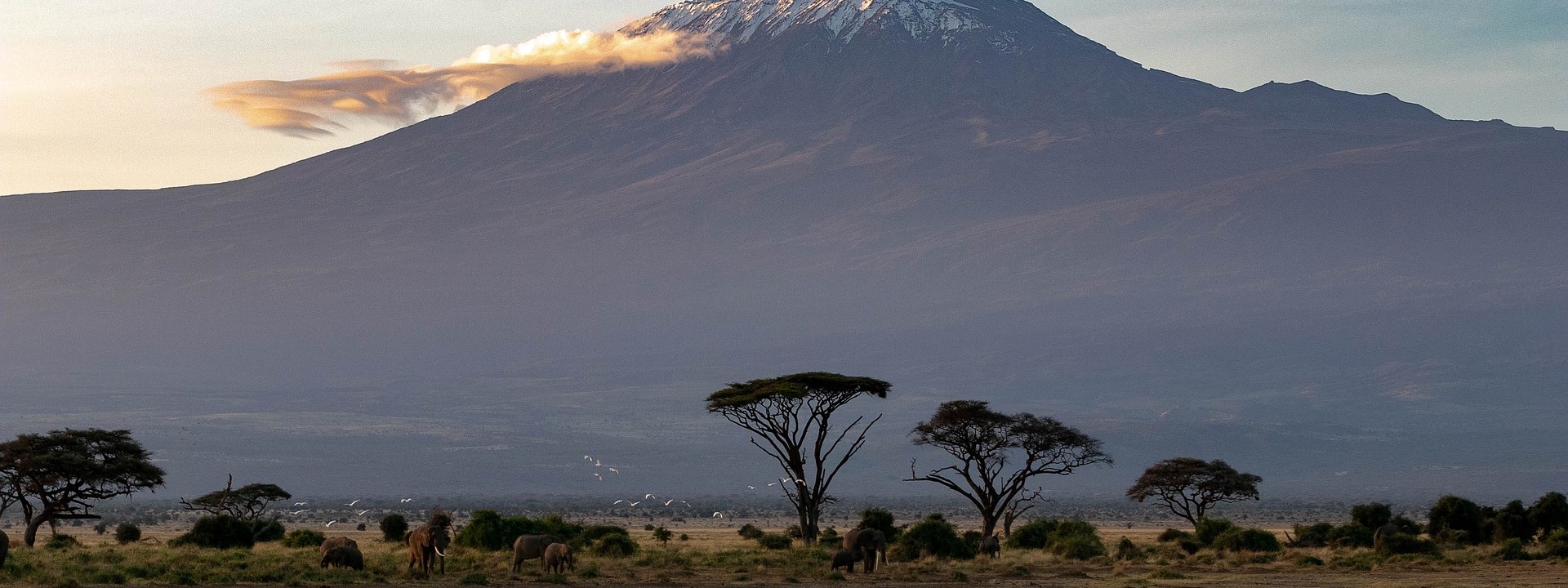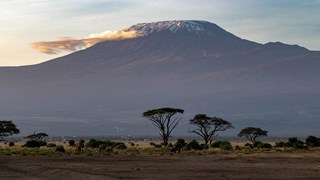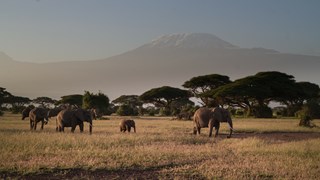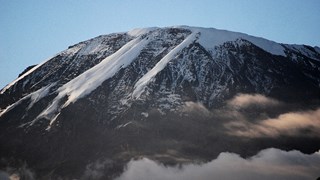Kilimanjaro Expedition
After the success of our 2022 expedition where 8 of the group summited we are heading back to the roof of Africa.
Kilimanjaro is one of the world’s greatest natural wonders. A perfect snow covered peak rising from the African Savannah, it takes your breath away when you first see it. During the climb you will pass through five unique climate zones described as ‘walking from the equator to the North Pole in a week’. You don’t need any technical experience to climb – currently the youngest person to reach the summit was 7 years old and the oldest 85. That’s not to say it isn’t challenging. This might well be the hardest thing you have ever done, but the sense of achievement and inspiration you will feel if you manage to reach the summit, will stay with you for the rest of your life.
Your holiday includes
- International flights
- Transfers to & from Kilimanjaro Airport
- 4 overnights at Honey Badger Lodge in twin rooms
- 7 nights in a tented camp
- Guides, porters and chefs throughout the tour
- Oxygen tank for each group of 3 trekkers (for use at the trained guide’s discretion)
- All meals as per itinerary
- 24 hour support from our Operations Team in Moshi, TZ
- 10 breakfasts, 10 evening meals and 7 lunches
- All National Park fees (entrance, camping/hut and rescue fees)
- Salaries for the mountain crew (guides, cooks, porter)
- Expedition Team Tips (£350 in line with guidance from Kilimanjaro Porters Assistance Program (KPAP))
- Camping equipment (where applicable)
- Transfer to and from Kilimanjaro National Park
- All taxes
Your holiday extras
- Single supplement (4 night’s at Honey Badger only - camping singles during climb not available)
- Personal travel insurance. You will need an insurance that covers over 5000 metres walking.
- Some drinks & some meals
- Optional excursions
- Personal extras.
- Visa fees
- Kit as outlined and sleeping bag.
The Machame route is one of the most popular and scenic routes to reach the summit of Mount Kilimanjaro in Tanzania. Known as the "Whiskey Route," it offers a diverse and challenging trek through various ecosystems, including lush rainforests, moorlands, and alpine deserts, culminating in a final ascent to Uhuru Peak. Throughout the route, you will have breathtaking views of the surrounding landscapes and explore endemic animal and plant species.
Location & Itinerary
DETAILED ITINERARY
Day 1. Fly overnight to Tanzania
Depart from the UK and fly to Kilimanjaro International Airport.
Day 2. Arrival
Once you arrive a transfer will take you to the Honey Badger Lodge, Moshi. Rest of the day at leisure to enjoy the peaceful gardens, take a dip in the pool and take in the first stunning views of Kilimanjaro.
Overnight: Honey Badger Lodge: Meals included: Dinner
Day 3. Free day
Free day to relax at the lodge and make final preparations for the forthcoming trek. You'll also meet your guide team who will check your kit.
Overnight: Honey Badger Lodge: Meals included: Breakfast & Dinner
Day 4. Machame Gate (1,490m) to Machame Camp (2,980m)
After a hearty breakfast, your guides will come to collect you and you will drive from the lodge to Machame village/gate (although you may have to walk to the gate depending on the road conditions). After registering at the gate, you will begin by entering the rainforest. Living up to its name, there is a strong possibility of rain in the forest, which will transform the trail into a very soggy, muddy and slippery experience. You will have a welcome packed lunch stop about half way and will reach the Machame camping area in the late afternoon. The crew will set everything out at your campsite and all you have to do is sit back, relax and enjoy the great outdoors.
Overnight: Camp: Meals included: Breakfast, lunch and dinner
Distance: 18 km, approx 7 hrs
Day 5. Machame Camp (2,980m) to Shira Camp (3,840m)
After an early breakfast, you will climb for an hour or so to the top of the forest and then for 2 hours at a gentler gradient through the moorland zone. After a short lunch and rest, you will continue up a rocky ridge onto the stunning Shira plateau, due west of Kibo, from which you will be able to see the breath-taking glaciers. After a short hike, you will reach the Shira campsite at 3,840m. The climbing crew will provide you with a tasty meal and you will then have plenty of time to sit back and relax.
Overnight: Camp: Meals included: Breakfast, lunch and dinner
Distance: 9 km, approx 6 hrs
DAY 6. Shira (3,840m) to Lava Tower (4,630m) to Barranco Camp (3,950m)
The route now turns east into a semi-desert and rocky landscape surrounding Lava Tower. After lunch you will climb a rocky scree path to the Lava Tower (4630m). This five to hour walk will probably be your hardest day so far and some climbers may begin to feel the altitude. However, our experienced team will coach you through the symptoms and provide you with all the advice and support you need. After lunch, you descend again by almost 680m to the Barranco camping area, whilst it may seem illogical to be going down at this point, you will quickly appreciate its true acclimatisation benefit. This descent to Barranco camp takes about 2 hours and offers great opportunities to take some beautiful photographs of the Western Breach and Breach Wall. The camp is situated in a valley below the Breach and Great Barranco Wall, which should provide you with a memorable sunset while you wait for the preparation of your dinner.
Overnight: Camp: Meals included: Breakfast, lunch and dinner
Distance: 15 km, approx 7 hrs
DAY 7: Barranco Camp (3950m) to Karanga Camp (4099m)
Your day begins by tackling the awesome obstacle of the Great Barranco Wall. Whilst initially an imposing site, its climb is invariably easier than anticipated. You will quickly appreciate how beautiful the mighty Kilimanjaro is when you reach the bottom of the Heim Glacier. You will then head down to the Karanga Valley where you will camp for the night. This is a shorter walking day of approximately 4 hours, there is an option for an acclimatisation hike in the afternoon.
Overnight: Camp: Meals included: Breakfast, lunch and dinner
Distance: 13 km, approx 7 hrs
DAY 8: Karanga Camp (4099m) to Barafu Camp (4550m)
Today is a similarly short day of around 4-5 hours of walking. You will make your way over the ridges and valleys, and join up with the Mweka route. After another hour or so, you reach Barafu (Swahili for Ice) Hut. This camp gives you a real experience of the icy elements. The camp is pitched on a narrow, stony ridge and exposed to the ever-present gales so tonight you will appreciate your warm and cosy sleeping bags. The summit is now only a further 1,345m up and you will make the final ascent later this evening. The team will help you to prepare your equipment and clothing for your summit attempt. You will go to bed at about 1900 and try to get some precious rest and sleep.
Overnight: Camp: Meals included: Breakfast, lunch and dinner
Distance: 13 km, approx 7 hrs
DAY 9: (Summit attempt) Barafu Camp (4,550m) to Uhuru Peak (5895m) to Mweka (3,100m)
At about 2330 you will be awoken to some tea and biscuits for the summit attempt. You will head in a north-westerly direction and ascend through a heavy scree towards Stella Point on the crater rim. Many climbers find this 6-hour walk to Stella point the most mentally and physically challenging aspect of the climb. At Stella Point (5,685m) your efforts will be rewarded with a short rest and the most magnificent sunrise you are ever likely to see (weather permitting). From Stella Point you will normally encounter snow all the way on your 2-hour ascent to Uhuru Peak, the highest point in Africa and an achievement you will remember for the rest of your life.
The walk back to Barafu from the summit, takes about 3 hours. Here you will have a well earned but short rest and collect the rest of your gear, before heading down to Mweka hut (3,100m). The route is not difficult and will take you down the rock and scree path into the moorland and eventually into the forest. Here you will rest and feel proud of your achievement.
Overnight: Camp: Meals included: Breakfast, lunch and dinner
Distance: 7 km to the top and another 23km going down, approx 7 hrs to reach Uhuru Peak and another 7-8 km get back to Mweka
DAY 10: Mweka Camp (3,100m) to Mweka
After an early and well-deserved breakfast, it is a short 3-hour and scenic hike back to the Park gate where you will receive your certificates; those climbers who reached Stella Point (5,685m) are issued with green certificates and those who reached Uhuru Peak (5,895m) receive gold certificates. You will be picked up and brought back to the lodge for a warm welcome, a cold celebratory drink and a hearty meal.
Overnight: Honey Badger Lodge: Meals included: Breakfast, lunch & dinner
Distance: 15 km, approx 3 hrs
Day 11. Free day
Free day to relax at the lodge or an optional activity.
Overnight: Honey Badger Lodge: Meals included: Breakfast & Dinner
DAY 12/13: Return to the UK
Time at leisure before a transfer picks you up for your flight home.
Meals included: Breakfast
Travel & Stay
For the first 2 nights and the last 2 nights, you will be accommodated in a comfortable Lodge (Honey Badger Lodge). Throughout the trip, you will stay in tents at designated campsites, strategically located along the trail which provide basic facilities such as tent platforms, dining areas, and toilet facilities.
Note – if we have an uneven split of male/female it may be necessary for safety on the trek to have 3 sharing a tent
Provisional Flight information
09/07/24 Heathrow to Kilimanjaro Dep: 1400 Arr: 0735 (+1)
20/07/24 Kilimanjaro to Heathrow Dep: 1755 Arr: 0620 (+1)
09/07/24 Manchester to Kilimanjaro Dep: 1455 Arr: 0735 (+1)
20/07/24 Kilimanjaro to Manchester Dep: 1755 Arr: 0650 (+1)
09/07/24 Birmingham to Kilimanjaro Dep: 0900 Arr: 0735 (+1)
20/07/24 Kilimanjaro to Birmingham Dep: 1755 Arr: 1315 (+1)
09/07/24 Edinburgh to Kilimanjaro Dep: 1445 Arr: 0735 (+1)
20/07/24 Kilimanjaro to Edinburgh Dep: 1755 Arr: 0640 (+1)
All flights are indirect and the group gathers in Doha for onward travel to Kilimanjaro airport.
Birmingham flights have long layovers at Doha.
23kg checked allowance for all passengers
Availability & Pricing
| Flights | Price | |
|---|---|---|
| Birmingham | £4225.00 | Available |
| Edinburgh | £4225.00 | Available |
| Heathrow | £4225.00 | Available |
| Manchester | £4225.00 | Available |
| Accommodation | Price | |
| Place in a Female Twin Share Room | £0.00 | Available |
| Place in a Male Twin Share Room | £0.00 | Available |
| Place in a Single Room (Honey Badger Lodge Only) | £220.00 | Available |
Not enough spaces left for you? Click here to join the waitlist
Host & Everything Else
It is of course impossible to predict exact weather conditions, and mountains are notorious for creating their own, localised conditions. The highland areas of East Africa, including Northern Tanzania where Kilimanjaro and the parks of Ngorongoro, Tarangire and Lake Manyara are located, have a pleasant, temperate climate throughout the year. There is a long rainy season in April/May and a second, shorter rainy period in November/early December. Temperatures vary greatly with altitude. At the foot of Kilimanjaro it’s usually approximately 25- 28⁰C, dropping to 15⁰C at night. At 3000m, daytime temperatures can be around 15⁰C. Above 4000m, the night-time temperatures will fall below freezing and it is usually no more than 10⁰C in the day. For more information we recommend visiting www.worldweather.org.
YOU WILL NEED
We ensure that you are properly equipped to comfortably reach the top of the mountain. Prior to arrival we will send you a recommended equipment list which includes the approximate local rental costs of items you may choose not to purchase. We provide all your camping gear including foam mattresses and tents. You will receive a pre-climb briefing where we inspect your gear to ensure it is suitable. We bring all the necessary cooking and eating equipment for on the mountain. Our expert mountain chefs whisk up hearty meals every day, ensuring no-one goes hungry on the mountain. We are happy to cater for specific dietary requirements, just let us know beforehand.
Please find below a list of what to bring on your trip.
Required Mountaineering Equipment (non-exhaustive list)
· 1 Mountaineering Sleeping bag (usually a -10-degree rating or better is recommended)
· 1 litre water canteen (sturdy plastic or lightweight metal) and/or 2 litre water bladder (Camel Bak).
· 1 LED Flashlight with spare batteries - or if you can get a wind-up one that is even better!
· 1 Pair of comfortable trekking/hiking boots
· 2 pairs of thick thermal socks and several pairs of regular walking socks
· 2 Fleeces
· 1 down jacket or long-sleeved wind-breaker (down jacket is unnecessary if you have a couple of good heavy fleeces)
· 1 set of thermal underwear (i.e. thermal vest & long-johns)
· 2 pairs of trekking trousers
· 1 waterproof jacket
· 1 pair of waterproof trousers
· 1 balaclava or ski-mask
· 1 pair of gloves
· 1 pair of hiking/walking poles
· 1 sun hat and sunglasses
· 1 duffle bag (min 70l) and 1 day pack
· Additional items for day pack:
· Sunscreen, sun hat and sun glasses
· Poncho or lightweight waterproof
· Spare socks (in case you come across some wet weather and your boots get wet)
· Camera
· Energy Bars (as many as weight and space permits.
Important luggage information
Prior to departure, you will need to pack the bulk of your clothing and gear into a large rucksack or duffel bag which will be carried by the crew.
Note, no bag on Kilimanjaro (irrespective of who carries it) should weigh more than 15 kg and will be weighed at the gate). Trekkers will carry a smaller backpack or day-pack with key items of clothing and personal effects. Anything else can be left securely at Honey Badger Lodge while you are in the mountain.
Passport and visas
Please allow plenty of time to renew your passport if it has less than 6 months validity. UK passport holders require a visa to enter Tanzania. At the time of writing this costs £40/$50 (single entry) and is obtainable on arrival or prior to departure online at: https://tzhc.uk/visa-application. We recommend you travel with 4 passport photos. Payment must be in cash when getting your visa on arrival. If you are travelling via Kenya to your destination you may also require a visa for Kenya. If you have connecting flights and your baggage has been checked all the way through to your destination you will not need a Kenyan visa. For more information we recommend visiting https://www.gov.uk/foreign-travel-advice/tanzania/entry-requirements.
Health
Make sure you visit your local health centre at least 2 months before departure, to be advised on any vaccinations needed. You should be up to date with routine courses and boosters as recommended in the UK e.g. diphtheria-tetanus-polio and measles-mumps-rubella), along with hepatitis A and typhoid. Malarial prophylaxis are required. Mt. Kilimanjaro – also known as the “Roof of Africa” – stands 5,895 metres above sea level and hence forms the highest freestanding mountain in the world. With a variety of landscapes at different altitudes, climbing the mountain is a truly exciting and unforgettable experience. Nevertheless, one should not overlook the fact that being exposed to high altitudes puts you at risk. Acute Mountain Sickness (AMS) or more commonly known as altitude sickness is one of the biggest threats when climbing Kilimanjaro. Please inform your guide if you have any symptoms or if you taking any form of medication. Your guide will be trained in mountain first-aid, and will carry a comprehensive first-aid kit on every trek. If you maintain your fluid level with at least 3-4 litres per day, ascend according to the itinerary, and are adequately fit, you are unlikely to experience any problems. Keeping warm is essential, so make sure you change into warm dry clothes at the end of the day, and wear layers on trek. We recommend bringing a personal first-aid kit containing the following: high factor sun cream, lip salve, moisturiser, plasters, antiseptic cream, insect repellent, cold/flu tablets, throat lozenges, electrolyte powder, aspirin or equivalent, muscle rub, nail scissors, 100mm elastic bandage, knee/ankle supports if needed, and wet wipes. For more information we recommend visiting fitfortravel.scot.nhs.uk
Money
The unit of currency is the Tanzanian Shilling (TSZ or TSH) although US dollars are widely accepted in hotels and tourist areas. We recommend that you change money at the airport. Credit cards are accepted in large hotels and some souvenir shops, but may be subject to commission.
Electricity
We recommend you check if you require an adaptor for your electrical items at: http://www.worldstandards.eu/electricity/plugs-and-sockets/
EXPERIENCED GUIDES
Whether you are an experienced mountaineer or a first-timer with a passion for a challenge, our highly trained guides have climbed with people of all fitness and skill levels over the years. They take great care of everyone and undertake health and well-being checks every day. Acclimatisation is the key to success with this mountain and this itinerary is specifically tailored to help you to acclimatise better. The day before your climb you will receive a full briefing from our specialist team, all your equipment will receive a final check and we will be able to answer any of your questions.
Being hydrated and well fed is one of the most important elements to summiting success. Whilst on trek your crew will provide you with delicious meals for breakfast, lunch and dinner. We have all the necessary cooking and eating equipment for on the mountain, and our experienced mountain chefs whisk up hearty meals every day, ensuring no one goes hungry. We are happy to cater to specific dietary requirements, just let us know beforehand.
THE MACHAME ROUTE
This is generally considered as the most beautiful route up Kilimanjaro; your efforts will be rewarded with a unique scenic splendour that is not seen on the other commonly traversed routes. Passing five stunning and diverse climatic zones it is one of the best routes to take in terms of acclimatisation. In certain sections it is steeper than other routes so this route is better suited to the slightly more adventurous hiker, but it is generally considered easiest overall. Only tented accommodation is available on this route but all your equipment and supplies will be carried up the mountain by our friendly porters and delicious meals will be made for you each day.
The recommended duration for this climb is 6 days, it is possible to shorten this to 5 but that reduces the chances of a successful ascent. We are making our climb over 7 days allowing an additional day for acclimatisation and increasing the changes of a successful summit climb.
Gallery
Why Book with Spice Escapes?
Financial Security
40 Years’ Group Travel Expertise
Travel with Friends
1300+ trips, 10000+ smiles
Not floating your boat? Check out our other Escapes…
Spend a day in the wonderful Marrakech and immerse yourself in the unique and interesting culture and sights it has to offer. Then embark on an exciting 6 day adventure with a wonderful guide that will take you hiking in the beautiful Atlas Mountains allowing you to explore the breath-taking views of the beautiful landscapes. The trip culminates with a summit attempt of Toubkal (13671 feet) - the highest mountain in The Atlas and highest peak in north Africa.

























